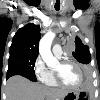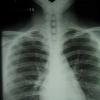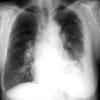

Coronal reformat of a CT of the chest in a patient with left sided mesothelioma. Note the extensive pleural mass with contraction of the left hemithorax. This image is from the full Tags: Mesothelioma View |
Topics: Health Tags: Mesothelioma View |
Tags: Mesothelioma View |
|||||||||
Tags: Mesothelioma View |
Mesothelioma, more precisely malignant mesothelioma, is a rare form of cancer that develops from the protective lining that covers many of the bodys internal organs, the mesothelium. It is usually caused by exposure to asbestos.
Its most common site is the pleura (outer lining of the lungs and internal chest wall), but it may also occur in the peritoneum (the lining of the abdominal cavity), the heart, the pericardium (a sac that surrounds the heart) or tunica vaginalis.
Most people who develop mesothelioma have worked on jobs where they inhaled asbestos particles, or they have been exposed to asbestos dust and fiber in other ways. It has also been suggested that washing the clothes of a family member who worked with asbestos can put a person at risk for developing mesothelioma. Unlike lung cancer, there is no association between mesothelioma and smoking, but smoking greatly increases the risk of other asbestos-induced cancers. Compensation via asbestos funds or lawsuits is an important issue in mesothelioma (see asbestos and the law).
The symptoms of mesothelioma include shortness of breath due to pleural effusion (fluid between the lung and the chest wall) or chest wall pain, and general symptoms such as weight loss. The diagnosis may be suspected with chest X-ray and CT scan, and is confirmed with a biopsy (tissue sample) and microscopic (Histopathology) examination. A thoracoscopy (inserting a tube with a camera into the chest) can be used to take biopsies. It allows the introduction of substances such as talc to obliterate the pleural space (called pleurodesis), which prevents more fluid from accumulating and pressing on the lung. Despite treatment with chemotherapy, radiation therapy or sometimes surgery, the disease carries a poor prognosis. Research about screening tests for the early detection of mesothelioma is ongoing.
Diseasesdb: 8074
Icd10: ICD10C45c45
Icd9: ICD9163
Icdo: ICDO90503-9055
Omim: 156240
Medlineplus: 000115
Emedicinesubj: med
Emedicinetopic: 1457
Meshid: D008654




